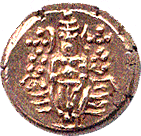Au fanam, 0,34
grams, 4,5 mm
Obv.: Formalized human figure of Tanjore type.
Rev.: Degenerated legend in Nagari characters in two lines, but the first letter of
both lines are vertical lines (Sawshaped on the Tuticorin fanam).
S.Scholten 1233b
The Dutch received their privilege to strike coins first in 1662. They got the
minting rights from Tanjore and derived the design of their Negapatam fanams from those
being struck at Tanjore. |
 
|
Ae double stuiver ND, 55,6 gram, 27,5 -
28,5 mm ca. 1658-1700
Obv.: Formalized human figure of Tanjore type of Kali figure
Rev.: NAKaPaDdaNaM in Tamil
Mitchener 1979, 1605-6, KM 29, Scholten 1243
Although they bore the name of Negapatam they were intended principally
for ceylon. |
 |
Ae stuiver
ND, 24,71 gr, 21-23 mm ca. 1657 - 1700
Obv.: Formalized human figure of Tanjore type of Kali figure or the ´standing king´ of
earlier Chola-Pandya coinage.
Rev.: NAKaPaDdaNaM in Tamil
Mitchener 1979, 1607. KM 28, Scholten 1244
Although they bore the name of Negapatam they were intended principally
for ceylon. |
 
|
|
|
Lead cash ND, ca.
1700-1784, 3,51 grams, 13,5-14,2 mm (2 or 4 cash?) Mitchener say 4 cash, but I think it is
wrong. Copper and lead do not have the same value after weight.
Obv.: Mint initial N above Company VOC monogram. Rev.: Two line Tamil legend citing mint
NAKaPa DdaNaM
Mitchener 1979 - 1611, Scholten 1242 |
 
|
|
|







